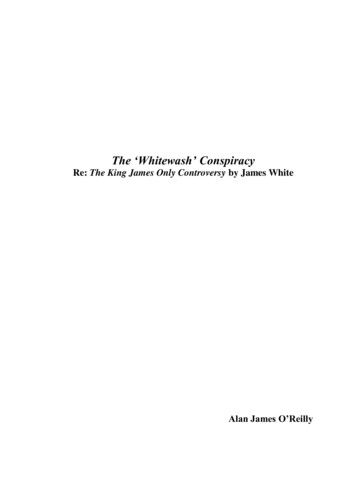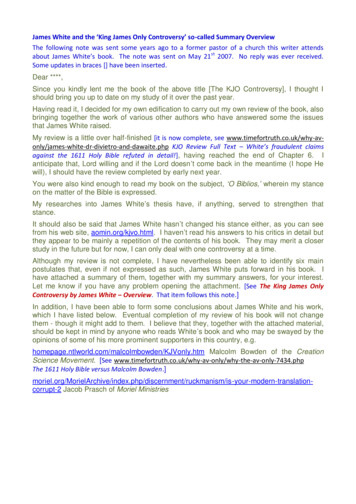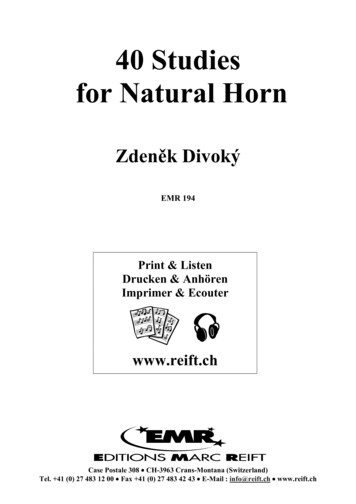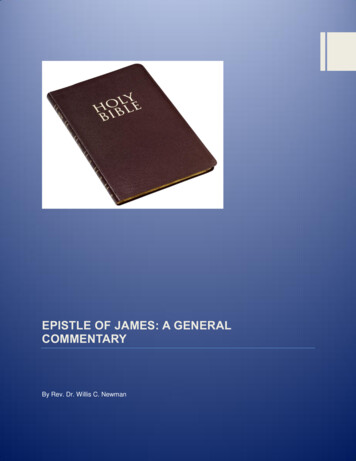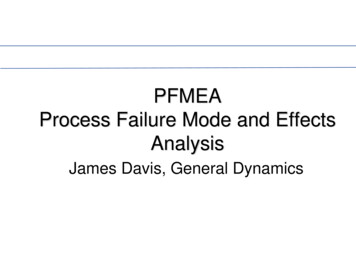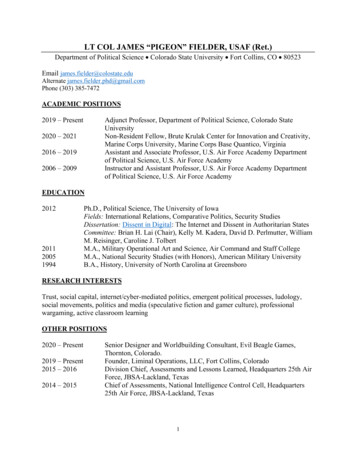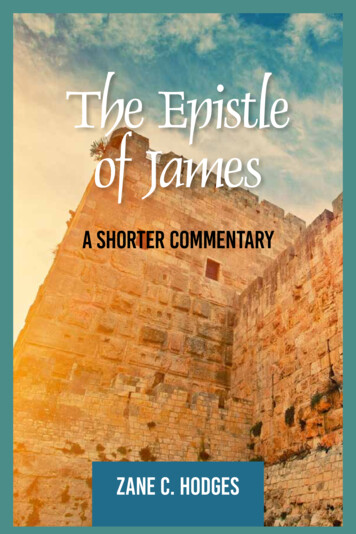
Transcription
JAM E SMATT CHANDLERLifeWay Press Nashville, Tennessee
EDITORIAL TEAMJeremy MaxfieldWriterJoel PolkEditorial Team LeaderReid PattonContent EditorBrian DanielManager, Short-Term DiscipleshipDavid HaneyProduction EditorMichael KelleyDirector, Groups MinistryJon RoddaArt DirectorPublished by LifeWay Press 2018 The Village ChurchNo part of this book may be reproduced or transmitted in any form or by any means, electronic ormechanical, including photocopying and recording, or by any information storage or retrieval system,except as may be expressly permitted in writing by the publisher. Requests for permission should beaddressed in writing to LifeWay Press ; One LifeWay Plaza; Nashville, TN 37234.ISBN 978-1-4627-4290-5 Item 005793413Dewey decimal classification: 227.91Subject headings: BIBLE. N.T. JAMES—STUDYAND TEACHING \ FAITH \ CHRISTIAN LIFEScripture quotations are taken from the ESV Bible (The Holy Bible, English Standard Version ),copyright 2001 by Crossway, a publishing ministry of Good News Publishers. Used by permission.All rights reserved.To order additional copies of this resource, write to LifeWay Resources Customer Service; One LifeWayPlaza; Nashville, TN 37234; fax 615-251-5933; phone toll free 800-458-2772; order online at LifeWay.com; email orderentry@lifeway.com; or visit the LifeWay Christian Store serving you.Printed in the United States of AmericaGroups Ministry Publishing LifeWay ResourcesOne LifeWay Plaza Nashville, TN 37234
CONTENTSAbout the Author 4Introduction 5How to Use This Study 6An Overview of James 8WEEK 1Brother/Servant 10WEEK 2Trials/Temptations 22WEEK 3Hearer/Doer 34WEEK 4Judgment/Mercy 46WEEK 5Faith/Works 58WEEK 6Blessings/Curses 70WEEK 7False Wisdom/True Wisdom 82WEEK 8Worldliness/Godliness 94WEEK 9Arrogance/Humility 106WEEK 10Oppressor/Laborer 118WEEK 11Suffering/Comfort 130WEEK 12Faithful/Faithless 142WEEK 13Wanderer/Restorer 154Leader Guide 166Takeaways 174
ABOUT THE AUTHORMATT CHANDLER serves as the lead pastor of teaching at The Village Churchin the Dallas/Fort Worth metroplex. He came to The Village in December 2002and describes his tenure as a replanting effort to change the theological and philosophical culture of the congregation. The church has witnessed a tremendousresponse, growing from 160 people to more than 11,000, including campusesin Flower Mound, Dallas, Plano, Fort Worth, and Southlake.Alongside his current role as lead pastor, Matt is involved in church-plantingefforts both locally and internationally through The Village, as well as in variousstrategic partnerships. Prior to accepting the pastorate at The Village, Matt hada vibrant itinerant ministry for more than ten years that gave him the opportunityto speak to thousands of people in America and abroad about the glory of Godand the beauty of Jesus.Matt is the author of Take Heart; To Live Is Christ, to Die Is Gain; Minglingof Souls; The Explicit Gospel Bible study (LifeWay, 2012), and The Apostles’Creed Bible study (LifeWay, 2017). He’s also a coauthor of Creature of the Word(LifeWay, 2012).Other than knowing Jesus, Matt’s greatest joy is being married to Laurenand being the dad to their three children: Audrey, Reid, and Norah.4
INTRODUCTIONFaith works. This is the message of James. James shows that faith and works arenot enemies but friends. Without faith, we could never find the strength to trustGod. We would never be able to see above the trials we meet and to keep oureyes focused on the King. We don’t work to be saved; we work because we’resaved. Without faith, our works are empty service. Without works, our faith is dead.Works authenticate and adorn faith.To illustrate this tension, James compares the person who has faith but notworks to the person who stares at his face in the mirror but then forgets the wayhe looks as soon as he turns away. But with faith that works, we stay on the journeyof being sanctified, knowing we’ll be perfected once we reach the other side.The repeated cry of James is that faith apart from works can never be sustained. We should proclaim this truth because faith makes us doers of the Word,not just hearers. Faith keeps us humble, not proud; directs our tongues to bless,not to curse; and causes us to show mercy, not judgment. Faith leads us to truereligion that extends itself in favor toward others. Faith causes us to preach thegood news to every tribe, tongue, and nation. Faith impels us to worship our Godfor all eternity. This is the message of James: faith works. 5
HOW TO USE THIS STUDYJames: Faith/Works provides a guided process for individuals and small groups towalk through the New Testament Book of James. This Bible study book includesthirteen weeks of content, each divided into three major sections: “Group Study,”“Family Discipleship,” and “Personal Study.” A leader guide is also provided toprepare those who are leading groups through this journey.GROUP STUDYRegardless of the day of the week your group meets, each week of contentbegins with a group session. This group session is designed to last ninety minutes,with approximately forty-five minutes dedicated to video teaching and anotherforty-five minutes to group discussion. Meeting even longer than ninety minuteswill allow more time for participants to interact with one another.Each group study uses the following format to facilitate simple yet meaningfulinteraction among group members, with God’s Word, and with the video teaching.STARTThis section includes questions to get the conversation started, a review of theprevious week’s study to reinforce the content, and an introduction to the newcontent for the current week.WATCHThis section includes key points from the video teaching, along with spacefor taking notes as participants watch the video.DISCUSSThis section includes discussion questions that guide the group to respondto the video teaching and to relevant Bible passages.6JAMES
FAMILY DISCIPLESHIPJames: Faith/Works presents a great opportunity for families to consider the truthsof the Book of James together. The weekly “Family Discipleship” section providesdiscussion and activities that encourage families to engage with this material ona deeper level.This section will guide your family to consider the truths of the gospel by utilizingthe following framework: “Time,” “Moments,” and “Milestones.” Use this framework for family discipleship in your home and on the go. Additionally, you’ll readScripture together and restate the main point of the week’s group session.PERSONAL STUDYTwo personal studies are provided each week to take individuals deeper intoScripture and to supplement the content introduced in the group study. Withbiblical teaching and interactive questions, these sections challenge individualsto grow in their understanding of God’s Word and to make practical applicationto their lives.LEADER GUIDEOn pages 166–73 at the back of this book, you’ll find a leader guide that will helpyou prepare each week. Use this guide to gain a broad understanding of the content for each week and to learn ways you can engage with members at differentlevels of life-changing discussion. 7
AN OVERVIEW OF JAMESThe Book of James is a wonderful companion piece to Jesus’ teachings as recordedin the four Gospels. James has a strong ethical emphasis that’s consistent with themoral teachings Jesus gave to His disciples. James also mirrors the sometimesharsh denunciations Jesus spoke against religious hypocrisy. Like Jesus’ teachings, the Book of James is a source of both exhortation and comfort, reproof andencouragement. James is known for being extremely practical, yet it containssome of the most profound theological truths in the New Testament.AUTHOR. James is named as the author in 1:1. A number of New Testamentpersonalities were named James, but only three are candidates for the authorshipof this book. James the son of Zebedee died in AD 44, too early to have beenthe author. No tradition identifies James the son of Alphaeus (see Mark 3:18) asthe author. This leaves James the brother of Jesus, also called James the Just(see Mark 6:3; Acts 1:14; 12:17; 15:13; 21:18; 1 Cor. 15:7; Gal. 2:9,12), as the most likelycandidate.Scripture identifies James as the brother of Jesus in Matthew 13:55; Mark 6:3;and Galatians 1:19. Though he wasn’t a follower of Christ during His earthlyministry (see John 7:3-5), a postresurrection appearance convinced Jamesthat Jesus is indeed the Christ (see Acts 1:14; 1 Cor. 15:7). James later led theJerusalem church (see Gal. 2:9,12), exercising great influence there (see Acts 1:14;12:17; 15:13; 21:18; 1 Cor. 15:7; Gal. 2:9,12).BACKGROUND. James was probably written between AD 48 and 52, thoughnothing in the epistle suggests a more precise date. James’s death in AD 62 or66 means the epistle was written before this time. Similarities to Gospel traditionsand Pauline themes are suggestive. If Mark was written around AD 65 and timeis allowed for the events of Acts 15 and 21 to have occurred between Paul’s firstand second missionary journeys, a date between AD 48 and 52 seems most likely.James led the Jerusalem church. The reference to “the twelve tribes in the Dispersion”(Jas. 1:1) suggests the letter was written to Jewish Christians living outside Israel.The reference to a synagogue in 2:2 also suggests that his audience was JewishChristians. References to their circumstances (for example, oppression by wealthylandowners, 5:1-6) could refer to congregations anywhere in the Roman Empire.8JAMES
MESSAGE AND PURPOSE. As a general epistle, James was addressed to abroad audience (Jewish Christians) rather than a specific audience (for example,Christians at Ephesus only). There’s an obvious concern to address internal andexternal difficulties that Jewish Christian congregations faced. Externally, theywere facing trials (see 1:2), particularly oppression of various sorts exerted bywealthy landowners. It doesn’t appear that the oppression was religious in nature.Internally, it appears that dissension was caused by a lack of self-control (see 1:13-17);uncontrolled speech; and false teachings that led to a misunderstanding of truereligion (see 1:19-27; 2:1-4; 3:1-8), favoritism toward the wealthy (see 2:1-13), andselfish ambition that opened the door to murder and criticism (see 4:1-12).James addressed these issues primarily through the application of principles definedby the Old Testament wisdom tradition. The solutions he named reflected thewisdom from above that comes from “the Father of lights” (1:17), who generouslygives wisdom to those who ask for it. Wisdom is required for proper speech inworship and for determining who ought to teach (see 1:19-27; 3:1-8). Wisdom isalso needed to avoid internal conflicts that create dissension within congregations(see 3:13-18; 4:1-12). The theme of faith in action is also important (see 1:19-27; 2:14-26);James demonstrated that faith that doesn’t express itself in good works is useless.Another theme of the epistle is ethics, especially social justice (see 2:1-13; 4:1-12; 5:1-12).STRUCTURE. The Book of James is a letter (an epistle), though only the greetingconforms to the ancient Greek form exemplified in Paul’s letters, especially Galatians.The Book of James has also been compared to Old Testament wisdom literature.Although James contains wisdom elements, such as comparing the wisdom ofthe world with the wisdom that comes from God, it also contains exhortationsand prophetic elements that aren’t common to wisdom literature.9
WEEK 1BROTHERSERVANT
GROUP STUDYSTARTWelcome everyone to session 1 of James: Faith/Works.Ask participants to introduce themselveswith quick answers to the following question.What’s one phrase, nickname, or fact that summarizes who you are?Today we begin a study of the Book of James. We’ll start by simply looking at oneverse—the introduction to the letter. Because all Scripture is the inspired Word ofGod, we can learn a lot from a greeting. James’s introduction identifies the themeand tone of the entire letter.Have you ever studied a book of the Bible? If so, what was it? Howdid you see the book differently after you completed your study?James is a highly practical letter to Christians in the early church, but it’s rootedin deep faith and rich theology. Perhaps more than any other book in the NewTestament, James emphasizes the application of Christian belief.To prepare for video session 1, pray that God willhelp each person understand and apply this truth:James had a unique earthly relationship with Jesus, but hisletter clarifies what the Christian life should look like for allbelievers. The Book of James is filled with practical wisdom,calling us to live out genuine faith through good works.Week 111
WATCHUse the space below to take noteswhile you watch video session 1.He knows the hairs on your head. He knows all the days that He has for you.In fact, He put you together and put those days together so that you mightwalk in the fullness of joy, bringing the greatest amount of glory to God.The sovereign King of glory is not a taker. He is a giver.God leads us into the fullest possible life by revealing to us who He is.God is so about God that the Bible itself, first and foremost, is about God. It’s notabout you.God makes known to us the path of life.The “Thou-shalt-nots” are not God trying to take but God trying to lead youto something that’s going to bring you more joy than your idea of what’s goingto bring you joy.Salvation and obedience are the two ways God draws us into the fullest lifepossible.James was written to encourage Christians in an increasingly hostile environmentto live lives dependent on God and not give themselves over to the presumedcomforts of the world.THREE MAJOR THEMES OF JAMES1. Trials, suffering, and difficulty can be expected. They do not surprise the heartof God.2. This is about progress, not perfection.3. Riches and comfort will not satisfy the soul.12JAMESVideo sessions available at LifeWay.com/JamesStudy
DISCUSSUse the following questions to guideyour discussion of the video.How did James describe himself as he opened his letter in James 1:1?Why is it significant that James, as a Jew, mentioned both God and Jesus?What connotations does the word servant have? What does this selfidentification reveal about James? What does it suggest about thecontent of his letter? About his perspective on the Christian life?Read John 10:10.How do the concepts of Jesus giving abundant life and of Christiansobeying Him as Lord work together?Do you think of God as being more concerned with either your obedienceor your joy? How does your perspective on God affect your daily life?Read Psalm 139:16.How does believing that God created you and knows everything aboutyou affect your willingness to obey Him?Matt highlighted three major themes that will run throughout our study of James:1. Trials, suffering, and difficulty can be expected. They never surprise God.2. God desires progress, not perfection, as we follow Jesus.3. Riches and comfort will never satisfy the soul.Week 113
Which common struggle in the Christian life most often threatensto steal, kill, and destroy your joy and satisfaction?On a scale of 1 to 10, with 1 being spiritually dead and 10 being fullyalive in joyful obedience, how would you rate your relationship withGod? Explain your rating.Progress, not perfection, is James’s message on faith and works. Sanctification is anongoing work of the Holy Spirit in your life that conforms you to the image of Jesus.You hear the Holy Spirit’s voice as you read the pages of Scripture.Our goal is to move closer to being fully alive in Christ by the end of our thirteensession journey through the Book of James.What are your hopes and expectations for studying the Book of James?What remaining questions or comments do you have about thissession’s video teaching or discussion? What was challenging,convicting, encouraging, or timely for your current circumstances?Close in prayer.PRAYER REQUESTS14JAMES
FAMILY DISCIPLESHIPThe Book of James teaches us the way faith works. The Christian lifeinvolves learning how to live out what we believe about Jesus. Eachweek this “Family Discipleship” section will help parents walk alongsidetheir children and lead them toward Christ by sharing the truths they’relearning from the Book of James.“Family Discipleship” will follow a simple, three-part format: time, moments,and markers. Spend time together as a family in God’s Word. Look formoments throughout the day to reinforce the main truth of the week.Celebrate and remember milestones—significant ways God has workedin your lives. TIME. Read Psalm 139:13-16. Encourage children to read parts of theScripture if they’re able. Take turns reading the verses aloud. Explain thatGod created us and knows every detail about us. Help children see thatbecause God made us, He knows what’s best for us. This is why we loveand trust the Bible—because it’s God’s Word. MOMENTS. Look for opportunities to point out amazing wonders Godhas made, especially tiny details in nature. Emphasize the joy of God’sdesign. MILESTONES. Talk about reasons you celebrate birthdays. Look at thecalendar and find all of the birthdays in your family. Find December 25and ask your children what we celebrate on that day. Explain that Jesusgrew up in a family and that one day a brother named James would writea book in the Bible. Now almost two thousand years later, your family willspend time each week reading that book. Emphasize that James wroteto teach us how God wants us to live.Week 115
PERSONAL STUDYPART 1 / BROTHERIf you could gather all of the people who’ve ever lived—every person in history—James would stand out from the crowd as a man with a unique relationship to Jesus.The author of the biblical book bearing his name was also Jesus’ little brother.Technically, James and Jesus were half brothers. They shared an earthly mother,Mary, but James’s biological father was Joseph, while Jesus was born of the HolySpirit. He was the only begotten Son of God. Joseph was Jesus’ earthly father,but he and Jesus weren’t biologically related. James and Jesus, however, werebiologically related.How’s that for sibling rivalry? It’s not hard to imagine the mixed feelings Jamesmust have had growing up with the world’s greatest brother—literally. Jesus wasGod’s gift to humanity.As Jesus’ ministry began to grow, opinions about Him also grew increasinglydivided among the public and even in His own family.Read Mark 3:13-19. Record the names of Jesus’ twelve disciples.You may have never thought too much about it, but notice that Jesus’ own familymembers were conspicuously absent. Look at their reaction in the next verses.Read Mark 3:20-21. What did Jesus’ family think about Jesus and why?16JAMES
A few chapters later Jesus told the disciples that He had chosen these soberingwords:A prophet is not without honor, except in his hometownand among his relatives and in his own household.MARK 6:4Read Mark 6:1-4. Why was it hard for people who knew Jesus to believein Him?Have you found spiritual conversations to be easier or harder amongnonbelieving family and friends? Why?Jesus’ own family, including James, thought He was getting carried away with thewhole religious thing. Put yourself in their shoes, and their reaction seems prettyreasonable. In Mark 3 Jesus’ small-group discussion had gone so long and drawnso many people that He wasn’t even able to eat. His family thought He was crazy!Picture the scene. James and his family showed up to talk some sense into Hisoldest brother, but the house was so packed that they couldn’t even get in to seeHim. Frustrated and desperate, they had to ask someone to ask someone toask Jesus to come out. On top of that, religious leaders among the crowd wereaccusing Jesus of being demon-possessed (see v. 22).Read Mark 3:31-35. Why would Jesus’ words have been shockingin that moment?What changed about James’s relationship with Jesus after he believedin Him? What’s the difference between knowing about Jesus and trulyknowing Him?Week 117
When have you heard or spoken a difficult truth that encouragedsalvation or spiritual growth?We’re still prone to do the same thing Jesus’ family did. Especially in our comfortable American Christianity, it’s easy to discourage people from being too devoted.Maybe you’ve had an ongoing dialogue in your heart and mind about how seriously you should take the whole Jesus thing. What if your faith meant a changein attitude, lifestyle, or spending? What if it meant sacrifice or hardship? What if itmeant doing something that made the rest of the world, even the people closestto you, think you’d lost your mind?James was literally and biologically related to Jesus, but Jesus said that wasn’tenough. The right family can’t save you. People often say things like “I’ve alwaysbeen a Christian” or assume they are because they were born into a family thatoccasionally went to church, celebrated Christmas, and maybe even observedEaster. But recall Jesus’ words to His own mother and brothers.Jesus was abundantly clear. Your family can’t save you. A relationship with Godis a matter of personal faith expressed through active obedience to the will of God.Conclude this part of this week’s personal study by praying aboutthe following questions. Have I been relying on my upbringing, my family, or my senseof reason to shape my view of God? Does total faith in Jesus seem unreasonable? Are certain areasof my life currently off limits to God? Am I seeking to know and do the will of God? How will I respond to Jesus today?Ask God to reveal Himself to you as you continue studying His Wordso that you can know and do what pleases Him as your Heavenly Father.18JAMES
PART 2 / SERVANTTruly, truly, I say to you, unless one is bornagain he cannot see the kingdom of God.JOHN 3:3This was a radical statement among the Jewish people—God’s chosen people.Jesus told a religious leader the same thing He told His own mother, Mary, andHis own brothers, including James. Biology isn’t enough. Tradition isn’t enough.Read John 3:1-21. In your own words, summarize Jesus’ teaching on belief.We can never be good enough. We need the cross. We need the resurrection.We need Jesus. We’re saved by faith alone by grace alone through Christ alone.Notice that when Jesus explained our need to be born again, He concludedby saying saving faith must be lived out in active obedience to the will of Godour Father. This idea sounds familiar.According to Jesus, how do our acts of obedience relate to our faith?The people of God are born again into the Heavenly Father’s family. We needa change of heart in order to experience abundant, eternal life with the King.Read Ephesians 2:1-10 to see how the gospel becomes effective in our lives.Everyone is or was once obedient to:Why is this an important truth for believers?Week 119
You’re saved by:You’re made for:Why are these important truths for believers?You haven’t been saved by your good works, but it’s absolutely clear throughoutScripture that you’ve been made for good works. Men and women who’ve beenborn again confidently walk in the light of Christ, doing the good works God hascreated them to do.Faith works. Faith is sufficient for salvation. Faith is seen in good works. God doesthe saving. You do the serving.The Book of James begins with the author identifying himself by name and as“a servant of God and of the Lord Jesus Christ” (Jas. 1:1). He defined himself byhis relationship of active faith and obedient service.On a scale of 1 to 10, how likely would someone be to identify youas a servant of Jesus?12345678910Would never cross their mind The most obviousthing about youHow would you explain the difference between calling yourselfa Christian and being a servant of Jesus Christ?Something interesting is going on here that we can easily miss in our Englishtranslations. The original Greek text of the New Testament uses James’s Hebrewname: Jacob. Not only would the original audience know James, the brotherof Jesus and the leader in the Jerusalem church, but they would also catch theauthor’s symbolic identification with his audience.20JAMES
In biblical history, Jacob was the father of the Jewish nation. After he wrestled withGod, God renamed him Israel. Jacob had twelve sons who became the twelvetribes of Israel (see Gen. 32:28; 35:9-11,22-26).Later in biblical history, the Assyrians conquered the Northern Kingdom of Israel,and the Babylonians then conquered the Southern Kingdom. This period of captivityand oppression came to be referred to as the dispersion—the same word Jamesused to address the early church audience: “to the twelve tribes in the Dispersion”(Jas. 1:1).This simple form of address has profound significance. After Jesus’ ascension,the Christian church was almost immediately persecuted and scattered fromJerusalem into Judea and Samaria, spreading the gospel to the Gentiles (seeActs 1:8; 8:1).Just as Jesus taught that the family of God is those who do the will of the Father,James presented the church as the faithful dispersion —the holy people of God’snew covenant. In Acts 15:13-18 James publicly declared that the Old Testamentprophecy of God’s gathering His remnant was being fulfilled in the church.James encouraged Christians to faithfully serve Jesus as their King. This encouragement would have been comforting and countercultural. When Jesus is Lord,we pledge our allegiance entirely to Him. This stance will necessarily put us atodds with our culture at some point.In what ways does living for Jesus put Christians at odds with culture?The Christian life isn’t easy. Serving God through faithful obedience to Jesus won’tequal health, wealth, and happiness in the earthly sense. In fact, Jesus promisedthat when we truly identify ourselves with Him, we’ll experience persecution (seeJohn 15:20). James knew it. The early church knew it. It’s still true today.Prayerfully reflect on this question: Am I willing to identify with and livefor Jesus, boldly serving Him as my Master, no matter what?[Jesus] said to all, “If anyone would come after me, let himdeny himself and take up his cross daily and follow me.”LUKE 9:23Week 121
6 JAMES HOW TO USE THIS STUDY James: Faith/Works provides a guided process for individuals and small groups to walk through the New Testament Book of James. This Bible study book includes thirteen weeks of content, each divided into three major sections: Group Study,
